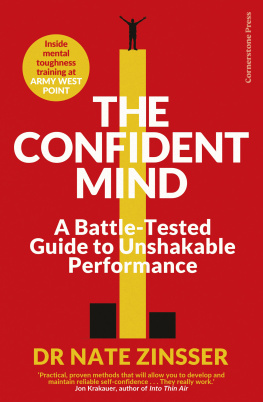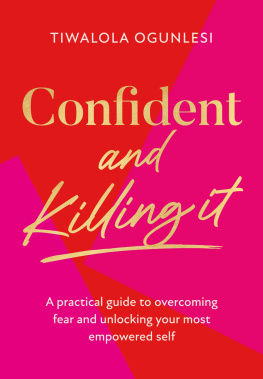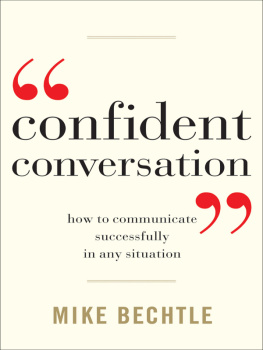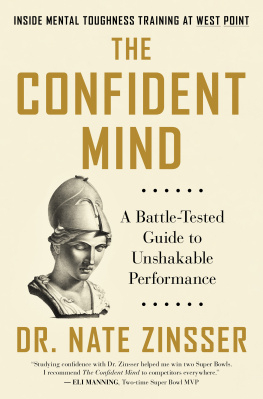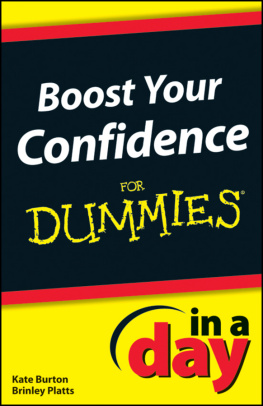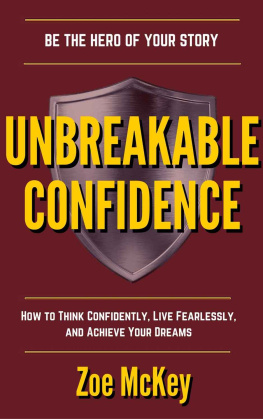
WRITE-ON PAGES
Any references to writing in this book refer to the original printed version.
Readers should write on a separate piece of paper in these instances.
Dr Nate Zinsser
THE CONFIDENT MIND
A Battle-Tested Guide to Unshakable Performance

To all who choose to go beyond the everyday normal and dare to pursue what they might be
Victorious warriors win first and then go to war, while defeated warriors go to war first and then seek to win.
S UN T ZU, T HE A RT OF W AR
Preface
On August 17, 2011, New York Giant quarterback Eli Manning sat for a live ESPN radio interview after his practice during the Giants training camp. When asked if he was a Top 10, Top 5 quarterback, Manning said, I think I am. And then when asked specifically if he was on the same level as New England Patriots quarterback Tom Brady, Manning paused and then said, Yeah, I consider myself in that class and Tom Brady is a great quarterback.
Mannings statements touched off a torrent of media hysteria. Columnists and bloggers wrote at length about how indefensible Mannings opinion was. How in the world could Manning, with only one Super Bowl championship and MVP award and only two Pro Bowl appearances on his rsum, compare himself to Brady, the six-time Pro Bowler, three-time champion, and two-time NFL MVP? Brady was coming off an excellent 2010 season, throwing thirty-six touchdown passes and only four interceptions, while Manning had thrown a league-high twenty-five interceptions. How could Manning think of himself as Bradys peer?
The answer to that question goes right to the heart of human performance: Eli Manning believes hes as good as any QB in the league because he knows he has to believe it. He understands what all champions either know intuitively or have learned during their careers: a performer has no choice but to be totally confident in him- or herself if the true goal is to perform at their top level.
Confidence makes ones peak performance possible, and thats why its of such great importance to anyone who has to step into an arena and deliver their best. Think for a moment about Elis reality. Most fall and winter Sunday afternoons, hes onstage in front of eighty thousand spectators and millions more watching on TV; his every action on the field (and plenty of them on the sideline) will be analyzed, judged, and criticized by football experts and casual fans alike. If he doesnt have the conviction that he can do his job as well as anyone else (even the guy many consider to be the greatest of all time), then he invites uncertainty, hesitation, tension, and mediocrity into his game. Without that level of confidence, Eli Manning would never play as well as he is capable.
And Manning isnt alone. Every quarterback in the NFL has to have that same level of confidence to play his best. In fact, every contestant in any other competitive pursuit needs it just as much to maximize his or her performance. Im not just referring to those relatively few individuals who compete in college, professional, or Olympic sports: Im describing anyone who is striving to achieve success in any field. No matter what game you happen to play, you perform best in that state of certainty where you no longer think about how you will hit the ball, throw the ball, or make the move/speech/proposal or about what the implications of winning and losing might be. All those thoughts interfere with (1) your perception of the situation (like the flight of the ball or the movement of an opponent or the understanding of a customer), (2) your automatic recall from your stored experiences of the proper response, and (3) your unconscious instructions to your muscles and joints about how precisely to contract and relax in sequence to make the right move or the right comment at the right instant. Whether your game involves instantly reading a hostile defense and delivering a football to the right spot, returning an opponents serve, or delivering a sales pitch to a roomful of skeptical prospects, you perform more consistently at the top of your ability when you are so certain about yourself, so confident in yourself, that your stream-of-conscious thoughts slow down to the barest minimum.
Back to Eli and his confident assertion that he was in the same class as Tom Brady. Fast-forward from that training camp interview in August 2011 to February 5, 2012, to the conclusion of that seasons Super Bowl. Eli Manning is standing at the center of Lucas Oil Stadium in Indianapolis hoisting the championship trophy and receiving his second Super Bowl MVP award. Mannings New York Giants have just come from behind to defeat Tom Bradys favored New England Patriots. In the closing minutes of the fourth quarter, with the Giants trailing, Manning engineered the 88-yard game-winning drive, making four clutch throws, including a 38-yard pinpoint completion to a tightly covered receiver, unanimously regarded as the play of the game. Eli Manning showed the world that on that field, on that day, he was indeed a Top 10, Top 5 quarterback, and that his statement the previous summer was simply the honest expression of a confident competitor.
Now heres a little secret Eli Manning didnt always have that level of total confidence. Despite being the number one pick in the 2003 NFL draft, he had a rough transition from college to the pros, and many questioned whether hed ever live up to the high expectations that come with being a first-round selection and lead his team to a championship. But in March 2007, Eli Manning started working with me for the express purpose of becoming a stronger, more confident leader with a swagger to match his conscientious preparation.
So when August 2011 came around and Eli Manning was asked if he was in Tom Bradys class, I wasnt surprised by his answer. By that time Eli had won what we will call the First Victorythe conviction that he was good enough to play at a high level on any field against any opponent. He had been exercising his confidence muscles for over four years by then, and despite having had to learn two new offensive systems because of two head coaching changes, despite two recent losing seasons, and despite a revolving door of offensive linemen and other teammates, Eli Manning believed he was as good as any player in his position. He had won the victory in his heart and mind, which gave him the best chance to win on the field in the toughest conditions.
Football experts are still debating whether Eli Manning is indeed a Top 10, Top 5 quarterback. Arguments about players go on endlessly. What isnt up for debate is that Eli performed at the highest level in a very competitive professions most demanding and important position for many years until his retirement in 2020. He made the best of his talent and his preparation by building his confidence, protecting that confidence, and playing confidently. He became as good as he could be. The real question is about you. Are you as good at your job, your profession, your passion, as you could be? Would your life be different if you won your own First Victory and had Elis level of confidence (not his arm, not his football IQ, just his confidence)? Im pretty sure your answer is yes. In the pages ahead, you will find what youre looking for.
INTRODUCTION
What Confidence Is and Isnt
Next page
